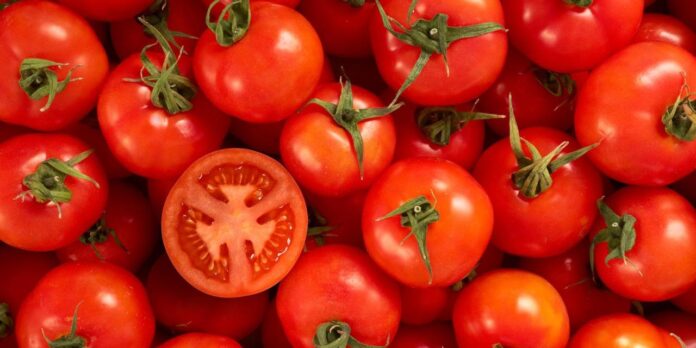Dangote tomato processing plant and three other firms would resume production by January 2019.
Mr Emmanuel Ijewere, the Vice President, Nigeria Agribusiness Group (NABG), said in Abuja at the Alliance for a Green Revolution in Africa (AGRA) and Micro Reforms for African Agribusiness (MIRA) Nigeria Project Stocktaking.
The plants, he said, would encourage backward integration and bring indigenous companies at par to effectively compete with importers of tomato paste.
Ijewere alleged that most of the tomato processing companies initially were shut down because the Nigeria Customs Service (NCS) was not implementing the policy, which made it cheaper to import tomato paste from China and Italy.
According to him, the NCS will commence full implementation of New Tomato Production Policy, which will give room to those firms that shutdown previously to resume business.
The president said that the policy was approved by the Federal Executive Council last year, but it was not implemented by NCS until Vice President Yemi Osinbajo compelled them to do so.
According to him, none of the tomato grown in the country is being converted to tomato paste.
Ijewere said it was cheaper for the tomato processing plant to import from abroad, noting that the yield coming from farmers was not enough to serve the tomato factories.
The president said that none of the 12 factories that had discussion with NABG were able to process tomato from Nigeria, adding that most of their factories were designed to import the paste into the country.
“They add water into the paste, put in the sachet and sell them out. We went to the government through the Vice President who is the head of the economy team to listen to us.
“The Vice President later pushed it further to the Federal Executive Council on the new tomato policy which was approved in march 2017,’’ he said.
Ijewere said between 2016 and 2017, efforts were directed on rice, while in 2018 effort was on Tomato and in 2019, efforts would be targeted at maize and soya value chains.
The president said the MIRA project was aimed at identifying authentic policy reforms needed in the entire agricultural value chain in support of the ongoing agricultural micro-economic policy and institutional reforms in Nigeria.
The Minister of Agriculture and Rural Development, Chief Audu Ogbeh, said that most of the produce had recorded production increase in 2017 compare to what was in 2016.
The minister, who was represented by Mr Azeez Muyiwa, a Director in the ministry, said an increase of 4.4 per cent was recorded on sorghum.
Ogbeh said 6.4 per cent was also recorded on cowpea, 11.4 per cent on soya bean, 7.7 per cent on cassava, 5.5 on groundnut and tomatoes 13.2 per cent, among others.
“ It is persuading to say that rice yield has increased continually over the last three years. All states have record increased in rice production over the last three years of the current administration
“ Lagos having the increase of 30.5 per cent in rice production which makes it the highest. This was achieved through support by government by providing agrochemicals, credit facilities from intervention fund,’’ he said.
The minister added that the country was able to save close to three hundred million forex due to import substitution and through the local processing of rice.
“There are increased in milling capacity of functional integrated rice processing mills from what used to be 13 to 21 mills and product from less than 600,000 metric tons production capacity to the current 1.2 million metric tons with total investment of over 400 billion naira.
“The challenge of post harvest loss still looms. To this event, government is working tirelessly on policies, laws and regulations that will improve production.
“That is why we are welcoming support initiative of MIRA being supported by AGRA and currently being implemented in Nigeria and other Africa countries.
“We are particularly excited all the review of this programme which will assist in building the future initiative and implementation of this programme will be implemented, ‘’ the minister said.
Mr Kabiru Ibrahim, President, All Farmers Association of Nigeria (AFAN), encouraged farmers to add value to their farm produce through processing to get more money instead of selling the raw.
He added that despite the challenge of flood which affected some states, they were still expecting bumper harvest from its members.
“Farmers are going to be more prosperous than before and we want to do this sustainably.
“We are interfacing with the seed council to make sure that farmers get good seed and we are embracing biotechnology to see that we add value to our produce so that productivity will be higher.
Dr Philip Ojo, the Director General, National Agricultural Seed Council (NASC), said that the council was partnering AGRA to ensure that farmers got quality and improved seeds timely to boost production.
Dangote tomato plant, others resume production in January
RELATED ARTICLES




